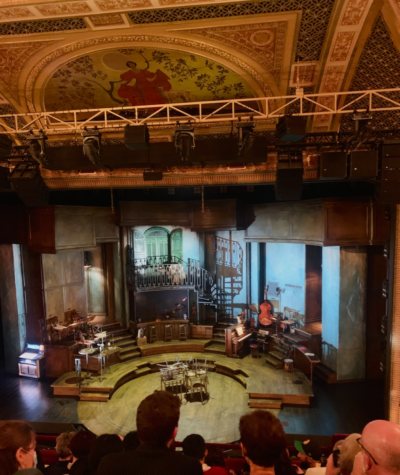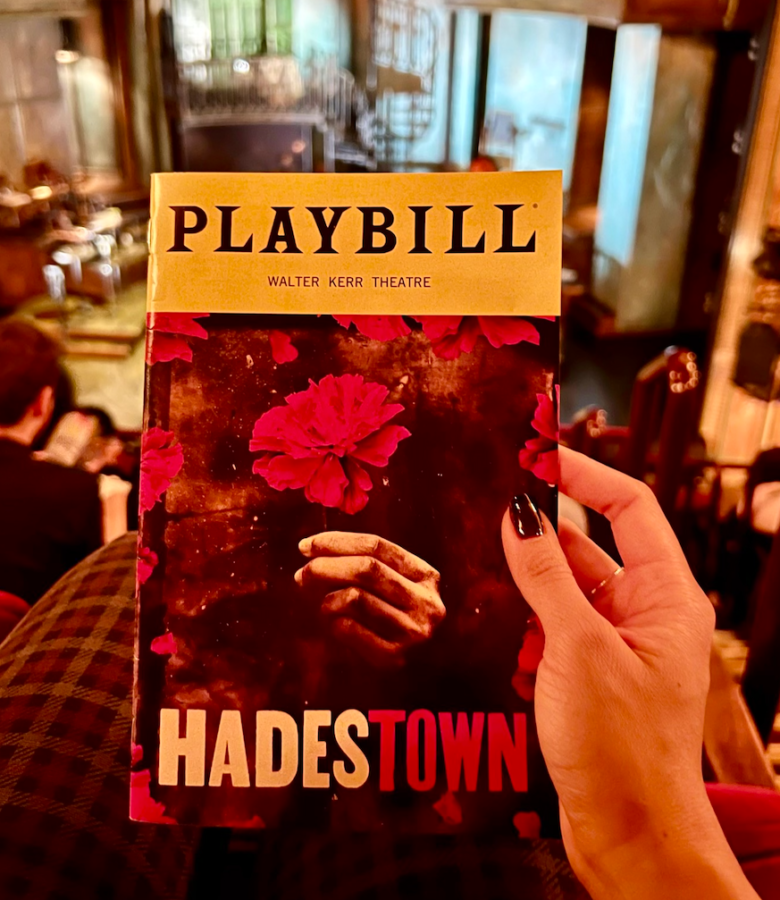‘Hadestown’ and the Allure of Tragedies
The ending is not the ‘end all, be all.’
‘Hadestown’ has received critical acclaim since its opening on Broadway. “It’s not only a beautiful retelling of a famous Greek myth, but it has an incredible musical score and lovely songs that tell a tale of star-crossed lovers,” said Autumn Magar-Matsuoka ’23.
A hushed silence sweeps over the theater as a man in a silver suit steps into the spotlight. He addresses the audience, calling out, “A’ight?” The crowd responds in kind, setting a silent agreement for the remainder of the show; however the story goes, the audience will experience everything with the characters — all the highs and lows, the hope and despair. The man nods and “Road To Hell,” the opening number of ‘Hadestown,’ begins.
‘Hadestown’ is a Greek mythology-inspired folk musical conceptualized in 2006 by Anaïs Mitchell. In 2019, the show made it to Broadway, opening in the Walter Kerr Theater, where it still plays today. It received eight Tony awards in 2019, including Best Musical.
I had the utmost pleasure of attending a performance of ‘Hadestown’ back in September 2022 after having first listened to the off-Broadway soundtrack in middle school — needless to say, I knew going into the show how it would end, but I was still ecstatic to experience the show in its entirety.
The musical reimagines the star-crossed love of Orpheus and Eurydice alongside the turbulent relationship of Hades and Persephone in a Great Depression-esque setting, taking the audience through a winding, but ultimately tragic, tale.
In the original Greek myth, Orpheus is a young man with a gift for music. He falls in love with Eurydice, who is charmed by his songs and agrees to marry him. However, their love is short-lived, as not long after, Eurydice passes away from a rattlesnake bite and descends into the Underworld.
Heartbroken, Orpheus journeys down to the land of the dead to plead his case for retrieving Eurydice to Hades, the god of the Underworld. Hades agrees, on one condition: the two of them may walk out of the Underworld but Eurydice must walk behind Orpheus, unable to interact with him until they are both back in the mortal world. If he looks back at her before they both arrive home, she returns to Hades forever.
Variations of the myth cite different causes for what happens next; some believe that Orpheus is so overcome with doubt that Hades allowed Eurydice to leave that he looks back to check. Others claim that Orpheus makes it back home, only to turn around a moment before Eurydice crosses the threshold. ‘Hadestown’ follows the version in which Orpheus turns around out of doubt.
The show remains mostly faithful to its source material, though some shifts are made to fit the setting and more seamlessly merge Orpheus and Eurydice’s story with Hades and Persephone’s. Regardless, the outcome is the same: Eurydice is dragged back down to Hades and Orpheus spends the rest of his days grief-stricken.
The musical does not shy away from its tragedy; in fact, ‘Hadestown’ possesses an intriguing degree of self-awareness and acknowledges that many audience members may already be familiar with the myths it is based on, referring to it as an “old song.” Even before the main characters have been officially introduced, Hermes, the narrator of the play, energetically declares, “It’s a sad song / It’s a sad tale / It’s a tragedy!”
Though this song glosses over the line, both the musical and the myth of Orpheus and Eurydice fit perfectly into the genre of stories classified as tragedies. Tragedies have persisted in the public eye for centuries, with other notable titles including ‘Romeo and Juliet,’ ‘Wuthering Heights,’ and ‘Death of a Salesman.’ However, their appeal is difficult to fully grasp due to the nuance in the genre.
When I asked people why they believed audiences were drawn to tragedies, I was surprised to find that a resounding belief was that tragic stories were more reflective of real life than other stories. “Having endings that are always happy is unrealistic,” Jason Lin ’23 said.
While it is true that life seldom ends with people living “happily ever after” as many novels and shows portray it, tragedies exist on the polar opposite side of the same spectrum. They are similarly exaggerated in their nature, with characters still falling into established arcs and endings.
In tragic stories, the hero makes an ill-fated decision that stems from an error in judgment in the hero’s character, which Aristotle first described as ‘hamartia’ in his book Poetics. Many times, the hero’s error in judgment is not inherently morally reprehensible, only ill-suited for the hero’s situation.
Regardless, the decision the hero makes sets the hero on a downward spiral that ultimately ends in them losing what they desire most. In the case of ‘Hadestown,’ Orpheus gets tantalizingly close to having the love of his life back, only to lose his resolve at the last moment and fail.
Still, I do think there is a reason for everyone’s insistence on the realism of tragic stories; tragic stories may not be more accurate to real life but they do connect with readers in a way few other genres can. Tragedies are able to speak to the audience’s sense of mortality. They remind people of the unpredictable nature of the world, and how easily lives can be torn apart.
Tragic stories are also capable of evoking visceral emotions that linger far past the end of the production and encourage audience members to think about the story of their own lives. “They let us feel thankful for our close relationships and self-reflect on what is very important to us,” said Hanks Tsai ’24.
‘Hadestown’ is no exception to this. Just before Orpheus looks back, in a liltingly hopeful voice, Eurydice sings of how the darkest hour precedes the dawn — only, she never gets to finish the lyric, interrupted by Orpheus turning around.
An audible gasp tears through the audience as this happens. Though I had heard this scene play out a myriad of times in the past, the weight of it when experienced with the rest of the audience still caught me off-guard.
This instant is the embodiment of the story’s tragedy. The youthful and optimistic attitude that allows Orpheus to strike a deal with Hades and rally people to his side becomes his undoing as his naïveté leaves his mind vulnerable to poisonous doubt.
For a single, heart-wrenching moment, the tension is pulled taut as Orpheus and Eurydice stare at each other, the gravity of their situation sinking in. All too soon, Eurydice is swallowed back into the Underworld, portrayed in the production by the lowering of a circular turntable located center stage.

The shock and horror bleed away as Orpheus collapses to his knees next to the pit into which Eurydice descended. In place of gut-wrenching grief is an echoing emotional emptiness, known as catharsis.
Catharsis is a term also coined by Aristotle, stemming from the Greek word “kathairein” meaning, “to cleanse or purge.” Within the context of a tragic story, it follows the point of no return, when the hero’s life is ruined beyond repair. For a brief moment, all emotions, positive and negative, are gone.
Though it may not seem like a pleasurable emotion, catharsis is a key component of the appeal of tragedies. “Catharsis in regards to tragic stories is self-perpetuating,” Autumn Magar-Matsuoka ’23 said. When audiences feel catharsis toward the tragedy of the story, they may also be reminded of hardships they and others around the world may be facing.
Sandwiched between strangers in a cramped theater, I felt a sense of solemn solidarity with the rest of the audience and the characters onstage as they mourned the love they had lost, the life that could have been theirs but wasn’t.
“Seeing others suffer makes you feel better because you aren’t going through it alone,” said Grace Lin ’23. Everyone faces misfortune and the consequences of mistakes at some point in their lives. What matters most is what happens afterward.
Amid the pin-drop silence, the spotlight shifts. Hermes steps up, grim acceptance etched on his expression, and breathes out, “A’ight,” before tilting his head up toward the mezzanine. The notes that opened the show are echoed as “Road to Hell (Reprise)” begins.
It is an achingly familiar scene. The lines that were once sung through jauntily are now spoken, and their meaning finally hits full force. “It’s a sad song,” Hermes states, and for the first time, everyone in the audience is on the same page. The crowd settles into their seats. No longer is there a distinction between those who have heard the story a thousand times and those who booked their tickets blindly. The story is over. Or is it?
While the Greek myth ends after Eurydice returns to the Underworld, ‘Hadestown’ finishes on a different note. The stage shifts back to its original set-up as the actors assume their opening positions, and the story begins again.
Hermes explains that in spite of its ending, they will sing of the tragedy again. “’Cause here’s the thing,” he says, a wistful gleam in his eye as he watches Orpheus and Eurydice meet again, “To know how it ends / And still begin to sing it again / As if it might turn out this time / I learned that from a friend of mine.”
Orpheus’s fatal flaw, his childishly naïve and stubborn approach to life, becomes the reason for the glimmer of hope at the story’s conclusion.
While it may seem contradictory to say that a crucial part of the allure of tragedies lies in hope, it is undeniably true. “People like the idea of hope, that even during the darkest time, there will be something to keep them going, like a light at the end of the tunnel,” said Mollie Ehrenberg ’23. Hope drives people forward and compels them to try again, to look past what is and wonder what could be.
Though the endings of centuries-old myths have already been established, the stories of our lives have not. People who read about Orpheus and Eurydice or see their tragedy acted out are able to find solace in the fact that their fates are not written in stone as the star-crossed lovers’ were. Their futures, whatever they might hold, are still ahead of them.
As it so happened, the performance of ‘Hadestown’ that I attended was the last one that T. Oliver Reid, who played Hermes, acted in. The cast took a moment at the conclusion of the final song to give him flowers and express their gratitude, and I was struck by the realization that, after this, the show was over. Yet, it was far from the end of the story.
Everyone would exit the theater and life would continue as normal. The actors would prepare for their next performance — or in Reid’s case, move on to a new adventure. Other audience members would return to their families. I would attend school the next day.
The world keeps turning in spite of the individual stories that exist within it. Life is messy and real people aren’t cookie-cutter tragic or fairytale heroes with meticulously woven fates and leitmotifs that play in the background as they go about their days.
Still, discordant as it may be, the song of life is an old one, and we’re going to sing it anyway. Maybe it will turn out for us.
“Seeing others suffer makes you feel better because you aren’t going through it alone,” said Grace Lin ’23. Everyone faces misfortune and the consequences of mistakes at some point in their lives. What matters most is what happens afterward.
Katrina Tablang is a Copy Chief for 'The Science Survey.' She enjoys journalistic writing because it enables her to explore a wide variety of perspectives...











